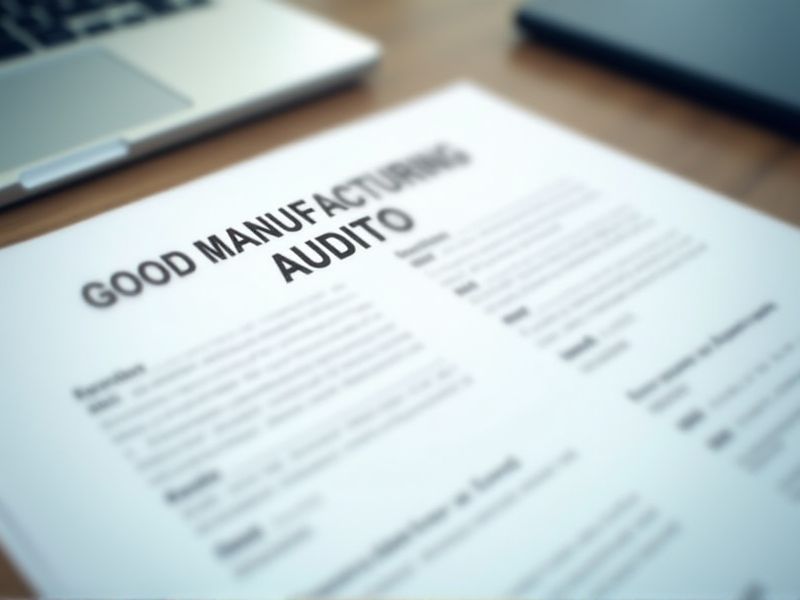
Good Manufacturing Practices (GMP) Auditors play a critical role in ensuring compliance with industry standards and regulations. Certification equips auditors with the knowledge and skills to effectively assess and validate manufacturing processes, thereby ensuring product safety and quality. These certifications also enhance an auditor's credibility, enabling them to identify discrepancies and recommend improvements accurately. Key certifications essential for a Good Manufacturing Practices Auditor include the following.
ASQ Certified Quality Auditor (CQA)
The ASQ Certified Quality Auditor certification is needed for Good Manufacturing Practices Auditors as it validates their understanding of quality auditing principles, crucial for ensuring compliance with industry standards. Certified auditors are equipped with skills to effectively assess processes, which leads to identifying inefficiencies and fostering improvements within the manufacturing environment. Possession of the CQA certification often enhances credibility with regulatory bodies, increasing trust and facilitating smoother audits. The comprehensive knowledge gained through CQA training helps auditors implement best practices, reducing risks associated with non-compliance and improving overall product quality.
ISO 9001:2015 Lead Auditor Certification
ISO 9001:2015 Lead Auditor Certification provides a structured framework for process auditing, enhancing GMP compliance by ensuring consistent quality standards. The certification equips auditors with a deep understanding of quality management systems, which is crucial for evaluating and improving manufacturing processes. It fosters credibility and trust between manufacturers and stakeholders, reflecting a commitment to quality and continuous improvement. Organizations with certified auditors may experience reduced risk of non-compliance and improved operational efficiency.
ISO 13485:2016 Lead Auditor Certification
ISO 13485:2016 Lead Auditor Certification equips auditors with specialized knowledge of quality management systems specific to medical devices, aligning closely with the stringent requirements of Good Manufacturing Practices (GMP). This certification ensures auditors can effectively assess compliance, reducing potential risks tied to non-conformities in medical device manufacturing. By understanding ISO 13485:2016 standards, auditors possess the expertise needed to enhance product quality and patient safety. The certification distinguishes auditors in a competitive market, demonstrating up-to-date competency and commitment to industry best practices.
Certified Pharmaceutical GMP Auditor
Certified Pharmaceutical GMP Auditors ensure compliance with Good Manufacturing Practices (GMP), which maintains quality standards in pharmaceutical production. Their expertise helps identify and address potential risks, reducing the likelihood of product recalls. By thoroughly assessing processes, they aid in maintaining consistent product quality and safety. The certification signifies a verified level of knowledge and skills, fostering trust with regulatory authorities and stakeholders.
Certified Food Safety Auditor
Ensuring food safety and quality compliance, a Certified Food Safety Auditor brings expertise to assess adherence to Good Manufacturing Practices (GMPs), minimizing contamination risks. Their specialized knowledge enables the identification and mitigation of potential hazards, ensuring product safety. They provide credibility and reassurance to stakeholders, fostering trust in manufacturing processes. Consistent audits by certified professionals can result in adherence to regulatory standards, reducing the likelihood of legal penalties and recalls.
Certified GMP Professional
Organizations prioritize GMP compliance to ensure product quality, safety, and efficacy in manufacturing. A Certified GMP Professional possesses specialized knowledge, contributing to rigorous and accurate audits. Their certification validates expertise in regulatory standards, assuring clients and stakeholders of adherence to industry guidelines. The presence of a Certified GMP Professional in auditing teams enhances credibility and can reduce the risk of regulatory non-compliance penalties.
HACCP Certification
HACCP Certification is needed for a Good Manufacturing Practices (GMP) Auditor because it ensures a comprehensive understanding of food safety principles. Knowledge of HACCP enables auditors to identify and evaluate potential hazards in food production processes effectively. It equips auditors with the skills to verify that control measures are in place to mitigate any identified risks. HACCP certification demonstrates a commitment to maintaining high food safety standards, which is crucial for GMP compliance.
Six Sigma Green Belt Certification
Six Sigma Green Belt Certification provides a structured problem-solving approach that is essential for identifying and eliminating inefficiencies in manufacturing processes, a core requirement of Good Manufacturing Practices (GMP) audit standards. Understanding Six Sigma tools equips GMP auditors with the skills to analyze data critically, enabling enhanced decision-making processes aligned with industry regulations. The certification emphasizes quality management and process improvements, which directly correlate with the rigorous quality standards GMP auditors must uphold. Possessing this certification demonstrates a commitment to continuous improvement and operational excellence, which reinforces credibility and trust in the auditing profession.
Certified Quality Engineer (CQE)
A Certified Quality Engineer (CQE) possesses data-driven expertise to identify and mitigate risks in manufacturing processes, enhancing overall product quality. This skill set aligns with the needs of a Good Manufacturing Practices (GMP) Auditor, who assesses compliance and ensures that production standards are consistently met. CQEs are trained in statistical analysis and quality control tools, enabling them to provide insightful recommendations for continuous improvement. Employing a CQE in the auditing process fosters a more accurate evaluation of manufacturing systems, leading to higher standards of safety and efficiency.
FDA Regulatory Compliance Certification
Obtaining FDA Regulatory Compliance Certification ensures that a Good Manufacturing Practices (GMP) Auditor has a thorough understanding of the regulatory standards required for pharmaceutical and food industries. This certification verifies the auditor's capability to assess and enforce compliance, reducing risk of non-compliance related issues such as product recalls or legal actions. It also increases credibility of the auditor's evaluations, fostering trust from organizations and stakeholders alike. Inadequate compliance oversight can lead to safety violations impacting consumer health and company reputation.
Summary
You, as a Good Manufacturing Practices Auditor, can anticipate enhanced credibility and trust from stakeholders upon obtaining relevant certifications. This accomplishment often leads to increased career opportunities and advancement within the industry. Certified auditors frequently report improved auditing skills and a deeper understanding of industry standards. The certification process typically fosters professional growth and confidence in executing audit tasks effectively.
